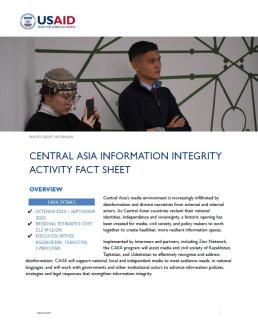Central Asia’s media environment is increasingly infiltrated by disinformation and divisive narratives from external and internal actors. As Central Asian countries reclaim their national identities, independence and sovereignty, a historic opening has been created for media, civil society, and policy makers to work together to create healthier, more resilient information spaces.
Implemented by Internews and partners, including Zinc Network, the CAIIA program will assist media and civil society of Kazakhstan, Tajikistan, and Uzbekistan to effectively recognize and address disinformation. CAIIA will support national, local and independent media to meet audience needs, in national languages, and will work with governments and other institutional actors to advance information policies, strategies and legal responses that strengthen information integrity.
GOALS
The USAID-funded CAIIA program aims to enhance efforts by Central Asian countries to maintain and strengthen the integrity of their information space and build societal resilience against disinformation, through the following goals:
Goal one (consumption of info):
Local information diversification and counter-disinformation efforts strengthen society’s ability to develop, disseminate, access, and use information more effectively as informed citizens.
Goal two (production of info):
National and local media produce balanced, factual, and unbiased reporting on domestic and international affairs relevant to local audiences that strengthen the information integrity of Central Asian countries.
Goal three (regulatory environment):
Central Asian countries advance information policies, strategies, and legal responses that strengthen information integrity of Central Asian countries.
RESULTS
In the first six months of implementation, the CAIIA program has:
Initiated 25 activities across the region (seven in Kazakhstan, six in Tajikistan and 12 in Uzbekistan) to increase high-quality, reliable content – including using national languages. Content will target vulnerable and underserved groups, focusing on countering key disinformation narratives and promoting socially important, inclusive content.
Launched its first in a series of online Learning Labs, building capacity of 52 (31W, 21M) representatives of major independent media outlets, fact-checking editorial offices, independent authors and content creators, and investigators from Kazakhstan, Tajikistan, and Uzbekistan on important topics like AI (artificial intelligence) and open-source intelligence (OSINT) skills.
Conducted in-depth gender equality and social inclusion (GESI) analysis in Kazakhstan, Tajikistan, and Uzbekistan. Analysis incorporated in-depth key informant interviews of representatives from the public sector, civil society, gender, health, and migration specialists, and focus groups of media professionals. Study results will guide efforts to incorporate gender equality into programmatic activities, monitoring and evaluation.
In Kazakhstan and Tajikistan, participating in four government working groups—connecting key draft legislation governing media and information space of the two countries with feedback from stakeholders and the wider public.
Program partners in Kazakhstan and Tajikistan have also provided 91 legal consultations, including 30 in Kazakhstan, 28 in Tajikistan and 33 in Uzbekistan to media, journalists and content producers on a broad range of issues including online media activities, access to information, defamation, the right to one’s own image, and copyright.
A CAIIA program partner in Uzbekistan arranged a critical roundtable discussion in Tashkent, Uzbekistan, on disinformation challenges attended by 50 (25W, 25M) representatives of government agencies, international organizations, local civil society organizations, academia and journalists, providing a platform for stakeholder discussion of the important issues of information integrity and disinformation challenges of the country.
In each of the three focus countries, the program has identified leaders and members for working groups to map the disinformation landscape. These working groups will develop whole-of-society roadmaps to address disinformation in each country, which will inform and fine-tune the program’s specific activities.
In Kazakhstan and Tajikistan, the program has identified members of new National Language Working Groups, convening academics, media leaders, and prominent cultural figures to collaborate with a cohort of bloggers and journalists to popularize the national languages and identify key milestones in the development and expansion of use of Kazakh and Tajik, particularly among the youth.
IMPLEMENTATION PERIOD: October 2023 – September 2028.
BUDGET: $12 million
CONTACT: Madina Kusmoldanova, Project Management Specialist, USAID Central Asia Regional Mission, mkusmoldanova@usaid.gov


